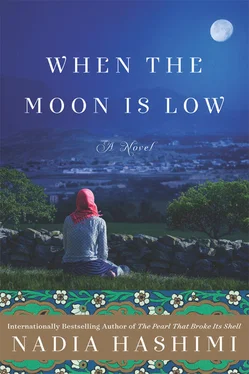When we went to visit my family, I noticed a change in KokoGul. She treated me like one might treat a cousin who’s come from out of town. She did not know what to do with me now that I was not hers to tease with her sharp tongue. Najiba was out of the house as was my brother, Asad, and my father had withdrawn from the world even more since I’d left our home. KokoGul was lonely without her audience. While outwardly it may have seemed that she’d warmed to me at last, I felt as if she had cooled. I went home often to see my younger sisters, but KokoGul kept her distance.
WHEN SALEEM TURNED FOUR YEARS OLD, THE LAST OF THE Soviet troops retreated. It was 1989. We prayed for tranquility.
It was not to be. Things worsened in Kabul while Mahmood and I were stunned when a second miracle visited our home. We named her Samira. With a son and a daughter, we were even more desperate for peace to return to Afghanistan.
Rockets showered our city as rival factions tried to lay claim to the capital.
Saleem was anxious to have a normal boy’s life. He asked me once to spend an afternoon at his friend’s home across town. I refused to allow it.
But why not, Madar- jan? he whined. Qasim is my best friend. I will be back before dinnertime.
No, Saleem- jan. Your father and I have already talked to you about this. That neighborhood is a magnet for rockets.
I made my voice as serious as possible to leave no room for discussion. I did not enjoy keeping Saleem from playing the way I’d seen boys play when I was his age, but we were living in a different time. He sulked for the remainder of the afternoon and went to bed without eating dinner, a punishment on both of us.
In the morning, our neighbor, Rahim, came by to chat with Mahmood. Rocket storms overnight had destroyed several homes and at least two children had been killed. I listened as I prepared bread and tea for breakfast. When we’d finished, I’d read from the Qur’an. How else could I protect us?
Saleem learned at school what I later heard from one of my friends. His friend Qasim had survived the rocket attack, but his three-year-old sister had been killed, suffocated under a pile of debris as her family tried to claw her free. Saleem said nothing to me and I had no words for him. This was a mistake. I should not have believed silence could protect us from the horrible truth.
THE NEW RISING REGIME, THE TALIBAN, INSISTED THAT WOMEN dress more modestly and men grow beards in accordance with Islamic tradition. Every day, they issued a new set of decrees and meted out swift punishment for those who disobeyed. As a woman, I wasn’t allowed to teach. Girls were not permitted in school.
This frightened and hurt me. The painful years when I was held back from school became the narrative of all girls. What would happen if one were to stomp and stab at an old wound? I was sick at the thought of so many empty classrooms.
These were razor-edged religious brutes. We could see them from our windows and heard their speeches. Though they were harsh and ignorant, some of our neighbors supported their rise and an end to the fighting.
We were all desperate for peace and that’s what they promised.
ALTHOUGH SALEEM WAS STILL IN GRADE SCHOOL, I SAT IN A living room with a group of teachers expelled from schools, huddled over glasses of diluted tea. Mahmood and I stayed up nights talking. We hoped our children wouldn’t hear our hushed, anxious voices. Aunts and uncles came by with tearful hugs and kisses as they made their way out of Afghanistan. Saleem would ask us where they were going and looked puzzled to hear the list of countries: Pakistan, Hungary, Germany.
Khala Zeba collapsed while shopping in the market one day. When Mahmood and I got word, we rushed to her side. She’d lost consciousness. At the hospital, a doctor told us she’d had a stroke and there was nothing they could do to help her. If she were going to recover, it would be on her own. We brought her home, and for three days I sat at her side, touching cool, wet rags to her forehead and dripping broth into her mouth. Mahmood and I prayed over her and thumbed her worry beads. I talked to her even when she didn’t respond. I wiped the thin stream of drool from the corner of her mouth as I’d done for my babies. My husband paced the room and kissed her hands, anguished with the feeling that he should be doing more. But there was nothing more to do. My mother-in-law left this life with as much grace as she’d lived it.
I should have been numbed by then, but I wasn’t. I felt robbed of a mother I’d just found, the first woman to treat me like a true daughter. I missed talking to her. She’d taught me how to swaddle Saleem and how to soothe his colic. She’d watched after him when I was at my heaviest with Samira and cooked him rice with mung beans. It was hard to look at my children without thinking of her. I looked for a way to distract myself.
For a few months, I taught several of the neighbors’ daughters in a makeshift classroom in our home. But when the Taliban executed three people in one week for running a secret school, even our neighbors kept their daughters home. Our once bright and cheerful home felt stifling and dark. Mahmood was becoming bitter and taciturn as well, reluctantly growing the beard required of him. At least the explosive skies had quieted with this new regime.
Saleem and Samira found ways to play and laugh at home. I could almost believe life was normal, listening to them from the next room.
SALEEM ENTERED THE SIXTH GRADE IN 1997. THE TALIBAN, NOW in control in Kabul, had arrested a handful of Europeans for taking pictures at a women’s hospital in Kabul. Mahmood and I stayed tight-lipped about the affair when Saleem asked us questions.
The Taliban feel that it is un-Islamic to take photographs of people, was all Mahmood told him. We couldn’t risk him repeating anything more damning to his classmates.
If I were a European, I never would have left my home to come to Kabul. Not in those days. I would have stayed in Poland or England or Italy where there were no whistling rockets above, where meat and vegetables were abundant and women weren’t afraid to step outside their homes. Why leave such a paradise to come to Kabul?
All television sets and video players were banned. Music was outlawed. Mahmood was wrathful, but it was only with me or within his closest circle of friends that he dared rant about the destruction of our society. He continued to work at the Ministry of Water and Electricity as a mechanical engineer. His original work had focused on bringing reliable fresh water and electric power to the outskirts of Kabul, but the focus changed under the new edicts. Every day there were new restrictions and warnings from the Taliban about what could or could not be built in Kabul.
“How many decades can we go on without progress or construction? This country is going back in time.” His shoulders slumped as if they carried the weight of the world. He was the bearded shell of his former self. I wondered if I would ever again see the tall, proud man who would spin his children in the air until they dizzied with laughter.
Samira should have been excitedly gathering pencils and reciting the alphabet to prepare for school. We could not make Samira understand why she could not attend school like her brother. I told her it did not matter and put all my energy into teaching her formal lessons at home. It felt good to teach again and to defy the edict in my own way.
IN 1999, DESPITE THE ODDS, MY BELLY BEGAN TO ROUND AGAIN. WE should have been joyous, but I felt like I was suffocating. I fought back tears every time I talked to Mahmood about our future.
“And now we are to bring another child into this Kabul? A Kabul that neither you nor I can recognize? For what? If he is a boy, he will grow up and know nothing but beards and fear. And God forbid this child has the sorry fortune to be born a girl! I just don’t think I could bear it. Already, I am ashamed to let Samira see what has become of me. I have had to cower under the stick of those turbaned tyrants while they stripped me of my career, my friends, my freedom to walk about! What future can there be for my daughter?”
Читать дальше












